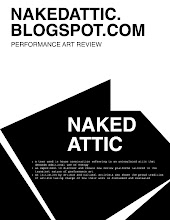
Francesco Vezzoli at the Guggenheim.
In his first live performance, Francesco Vezzoli, the young Italian video artist whose work has revolved around an interest in celebrity, restaged Luigi Pirandello’s 1917 play ‘Right You Are (If You Think You Are). The play is an investigation and dissection of the character Signora Ponza, played by Cate Blanchett, by a group of provincial Italians. Signora Ponza is absent throughout the play, created for us through the multiple vantage points of the other characters – a character with no presence, defined only by the attention devoted to it.
Set on a black stage in the center of the Guggenheim’s main rotunda, the performance and its proceedings exceeded what I anticipated. It came complete with stars being ushered from black SUV’s past anticipatory crowds, an hour and a half wait, closed guest lists and color-coded tickets. The museum generously provided opera glasses to view the stars (Including Natalie Portman and David Strathairn) to those of us not lucky enough to be seated on the rotunda floor.
The actors, who were seated and in costume, read their lines from stands set before them. The acoustics were bad higher up and the text hard to understand. With the exception of seeing Natalie Portman in a mustache (playing the part of Laudisi) there was little to hold one's visual interest. The crowd, already on its feet for almost two hours to get in and still standing, thinned quickly.
The hook for remaining was the anticipated appearance of Cate Blanchett in a costume designed by John Galliano. Let in on the grand finale by a nearby Guggenheim employee ('she’ll take the elevator to the fifth floor and then walk the ramp down past the people while the strobe lights go off') and tired myself, I left after the second act.
It is always interesting to see what is revealed by an artist shifting medium. What is notable in Vezzoli moving from his earlier video that used socially popular types (‘Caligula’, which mimics a film trailer, and ‘Marlene Redux: a True Hollywood Story!’ an expose on his own death) to performance is that, where those media types allude comically to other experiences – a film about a film that was never made and a film about a life that was never lived - this performance made no allusions, it simply was. There was no imagined deferral, no shared laughter at the possibility or impossibility of it, no self-deprecation, and no medium to humorously buoy us above the exclusivity of the fame that was its true content.
It is troubling to note in relation to Vezzoli's preoccupation with fame and exclusion (and perhaps it’s the gleaming black stage and David Straithairn’s leather pants that brought it to mind) that amongst Pirandello’s many achievements he is remembered for having given Mussolini his Noble Prize in Literature to melt down for the war effort.
.jpg)
No comments:
Post a Comment